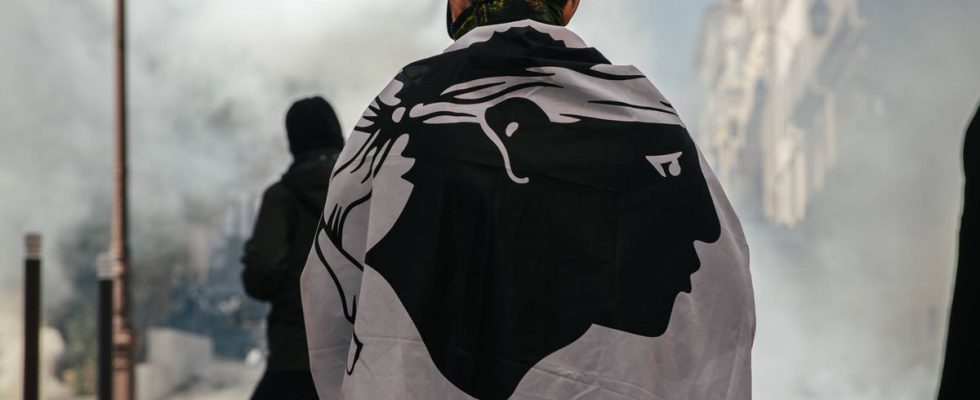Since the death of Yvan Colonna following his attack by a fellow prisoner in Arles prison, Corsica has observed a certain resurgence of political violence initiated, in particular, by the youth. Over the past two months, a new clandestine group, the GCC, “Ghjuventu Clandestina Corsa” (Corsican Clandestine Youth), has formalized its creation and the FLNC has claimed responsibility for 17 attacks. To try to understand the link between this youth and the nationalist struggle in Corsica, 20 minutes interviewed Thierry Dominici, researcher at the University of Bordeaux and specialist in the Corsican question.
What portrait to paint of Corsican youth today?
It’s a bit complicated because if you want, we tend to imagine youth as a generational population, but homogeneous, whereas in Corsica as elsewhere, they are not homogeneous populations.
In Corsica, something masks the socialization and politicization of young people in general, it is the nationalist mobilization. It is omnipresent in the framing of the media, in the framing of policies and also in the framing of research. It’s quite extraordinary when you think about it: you get the impression that in Corsica, there are only young nationalists. However, in the end, this youth, like everywhere else, feels downgraded in relation to the offer offered by the system in terms of success, jobs or the creation of a future.
This youth, who feels downgraded, turns to several forms of mobilization or politicization, the most visible of which is nationalism. But this is not the only point that defines it. If we listen carefully to the message carried by a large fringe of these young people, during the riots following the assassination of Yvan Colonna, they rather put forward this idea of downgrading.
Nationalism is therefore in Corsica the first contact of young people with politics?
Today, nationalism has settled on an island social and societal whole. In my work, I speak of massification, which means that nationalism has today reached a popular dimension. This means that draping oneself in a nationalist discourse will help produce a certain identity, even recognition. The nationalist thing, today, has become the main discourse of this society. Because you said nationalism is everywhere, including in sports and football.
A fifteen-year-old who has never experienced life outside the island is already immersed in a nationalist environment. Afterwards, he will stand out, but always in nationalism. It will produce, for example, a Corsican political ecology. He will introduce a Corsican republicanism. And so that’s it. It is the new phenomenon that lives, from a generational point of view, this youth today.
Precisely, this Corsican youth, finally nourished with the nationalist massification, would not it seek to want to live “its moment FNLC” to mark its political existence and to make its entry there? I am thinking in particular of the CCG which claimed its existence.
This is not the first time that new groups have been created. There were a lot of groups that were born and disappeared from the political field. Each time there has been a group, and especially the FLNC, it has always been claimed and carried by the youth. The FLNC was built, imagined by the nationalist youth – we said separatist at the time.
The GCC already claims this reality, that is to say the revolt carried by a youth as already supported by the FLNC. So afterwards, are they young people or not? Perhaps these are young people totally supported by the older ones, in other words young people who have been managing the armed struggle for longer. Or maybe it’s just young people getting organized. But for the moment, the only thing that we can see is that we have people who have claimed twenty or so very artisanal attacks.
The politicized Corsican youth, the one who is radicalized if you prefer, has been producing violence for several years. It has even reproduced itself from a generational point of view because those who started are now not so young. We now find them in politics with functions, positions and titles in terms of socio-professional status. So, one can imagine that these young people, because they could not know the myth of nationalism and the projection in the social bandit that the FLNC represents, wanted to organize themselves and to hope for the honors.
But this hypothesis of a youth who would like to “live their FLNC moment to gain honours” would only be true if, and only if, this youth was not tied to a political party. Because most of these young people, for the most politicized, are close to Core in front or a member of Corsica Libera. It is not Simeonism or even Jean-Christophe Angelini’s PNC that resonates the most with politicized young people.
Should we fear a return of mass political violence in Corsica?
If it reappears, it would be a failure of massification. It would be the failure of the political family that appeared in the years 75 (Aleria) and 76 (FLNC). If this happens in 2023, this political family will disappear So there may be a new generation, but will it obtain the same popular massification?
I believe that as long as we do not depoliticize the Corsican question, we will not succeed. What is interesting in the current discussions is that we are indeed in a logic of transfer of competences, on a region which aspires to more autonomy, and it is administrative.
But Gilles Simeoni no longer needs, since the last election, separatists who could want to recover more political space.
These separatists need more political space and they will do everything to get it back. They might trip up, but they won’t scare the crap out of a massive return to armed struggle, I don’t think so.

